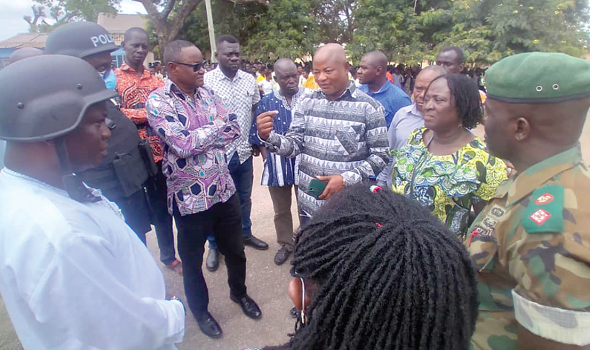Tackling rising riots in SHSs: Peace in Schools project launched in Upper East
Riots and demonstrations are a common phenomenon embarked upon by students, especially in second-cycle and tertiary educational institutions, to register their displeasure about developments in the institutions.
These aggrieved students, in the course of rioting, go berserk and destroy both personal and school properties in an attempt to draw the attention of school management and authorities to their grievances and problems.
Most often in an attempt to bring the situation under control and prevent further destruction of properties, as well as save lives, the educational institutions are closed down and students asked to go home and return later after calm has been restored.
For instance, this year alone in the Upper East Region, students of the Kongo Senior High School in the Nabdam District, Bawku Technical Institute in the Bawku Municipality and Bolgatanga Technical Institute in the Bolgatanga Municipality went on rampage during a demonstration, leading to the destruction of properties worth thousands of Ghana cedis.
After investigations, management of the affected institutions surcharged the students to pay for the estimated cost of damages to both government and personal properties to serve as a deterrent to others.
Peace project
It is against this background that Rural Initiatives for Self-Empowerment Ghana (RISE-Ghana), a non-profit-making organisation, has launched a ‘Peace in Schools’ pilot project in 15 senior high schools in the region.
The project, dubbed “Preventing extremism and conflict in educational institutions and schools”, is part of the larger “Preventing Electoral Violence and Providing Security to the Northern Border Regions of Ghana (NORPREVSEC)” project.
It is being led by COGINTA-Ghana, an NGO, and funded by the European Union (EU). It is aimed at supporting stakeholders in the peace and security architecture and strengthening local capacity to prevent violence and to ensure human security through increased capacity, collaboration and adoption of preventive diplomacy.
Activities to be embarked upon include organising capacity-building and sensitisation fora on Preventing Violent Extremism (PVE) for identifiable groups in the beneficiary schools to equip club patrons, student leaders and faith-based leaders with knowledge and skills to diffuse PVE messages to their students during weekly and monthly meetings.
Additionally, there will be training and support for representatives of identifiable groups in the beneficiary schools to develop and implement school-based PVE, year-long awareness-raising action plan through discussions, drama and faith-based outreaches.
Increasing riots
In an interview with the media after the official launch, Jaw-haratu Amadu, the Head of Programmes, RISE-Ghana, said the project was being embarked upon due to the increasing number of riots and vandalism in schools.
She noted that a road map developed on peace by the Upper East Regional Peace Council in 2001 identified second-cycle institutions as where conflicts occurred which were usually political and ethnic in nature.
She attributed the rising students’ unrest and disturbances to school authorities and the inability of teachers to create a platform to dialogue towards resolving the grievances of the students.
“I wish to advise school authorities to continue to dialogue with students when they have a myriad of grievances towards finding solutions,” she said.
Violent extremism
Ms Amadu stated that a key component of the project was to prevent violent extremism in the region which shares border with Burkina Faso, where jihadist groups have taken over some parts of the country.
“Since the region shares borders with some Sahel countries, it makes it vulnerable to possible extremist attacks which need to be prevented to save lives,” she noted.
Ms Amadu said “violent extremists take advantage of little conflicts among people and launch attacks to achieve their objectives”, adding that “therefore, there is the need to address the issue in the schools to protect the students from being brainwashed to be radical and cause mayhem in the society”.
She stated that the project was intended to fully equip the students in particular who out of their youthful exuberance could be lured to join extremist groups to engage in acts that had the tendency to compromise the security in the region.
The Upper Regional Director of the National Commission for Civic Education (NCCE), Mawuli Agbenu, in a presentation on the topic “Preventing violent extremism in school”, called on school authorities to devise effective measures to detect signals of radicalism in students.
He further entreated school authorities to find lasting solutions to the problems of students in a diplomatic way so as to prevent them from embarking on demonstrations which would lead to the destruction of properties.
The Head of Human Resource at the Upper East Regional Directorate of the Ghana Education Service (GES), Joseph Anaba, bemoaned the increasing rioting among SHS students, describing the situation as worrying.
He called for more proactive measures from school authorities to forestall disturbances by students as they would have dire consequences on academic work.



